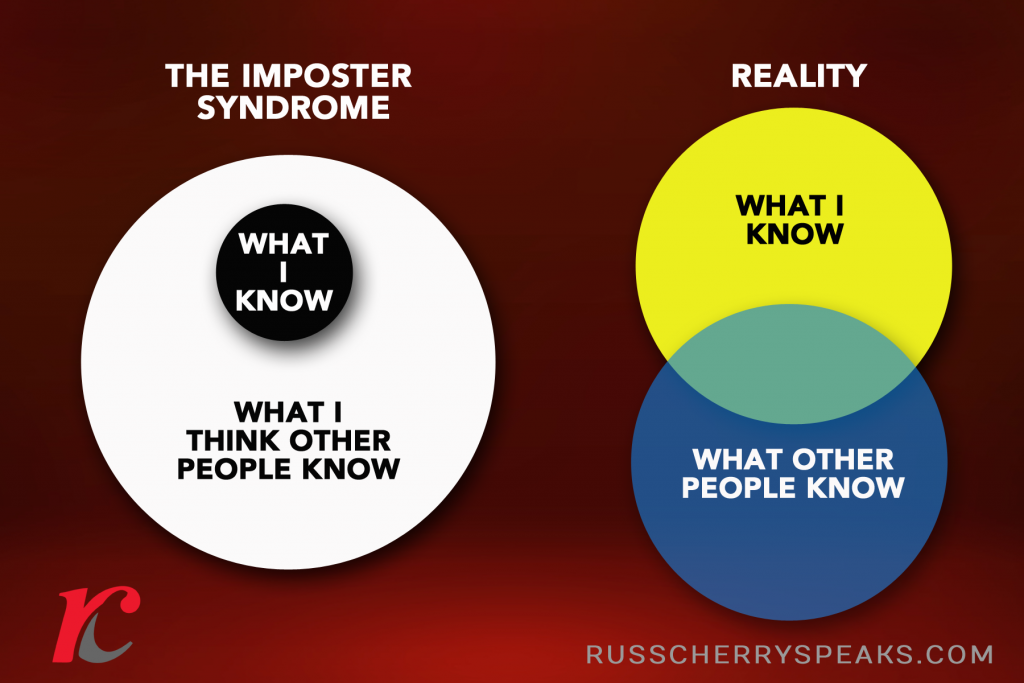You may have a syndrome and not even know it. Or maybe you’ve realized you have some symptoms, but may not have a define your problem. For instance, you’ve heard something like this play over and over in your mind:
“If an expert showed up right now to analyze my work I would be exposed as a fraud!”
Or maybe you dismiss significant accomplishments by saying you just “got lucky.” Maybe you say that achieving a goal wasn’t as hard as others might think–even though you focused and pushed and worked really hard at it every day. You can’t accept that you did a good job, or that your actions made a difference.
If these symptoms sound familiar, you probably have IMPOSTER SYNDROME.
So what is Imposter Syndrome? It’s a term used to describe people like you (and me) who have a hard time internalizing, recognizing or accepting their accomplishments. And you’re not alone; more than 70% of people have felt this way at one time or another, and a vast number constantly struggle with it.When Imposter Syndrome shows up in your life, you start thinking that everyone is smarter than you, that there are a lot of things that you don’t know and that everybody else already knows, and that you are expected to know them too. I’ve worked with people who have deflected compliments on successful multimillion dollar projects that took more than a year to complete. They say things like, “It wasn’t a big deal.” or “We were really lucky that the stars aligned in our favor.” REALLY? From where I sit it looks like you worked 10 hours a day 6 days a week for 18 months to pull this off.
But here’s a fact: reality and the way you feel when you are feeling like you’re an imposter are two very different things.

First, no matter what career you’re in, you constantly have to be learning new things. As a result, you might feel that you are always running, always having to learn, and never actually finishing. In short, you might feel the finish line keeps moving forward–no matter how fast you run. Second, you may feel as though you’re failing at what you do, regardless of positive results you’ve gotten in the past or the positive results that are sure to come. You may also believe, falsely, that everyone else “got it” on their first try, forgetting that failure is a natural part of learning, that few (if any) people get something perfect the first time they try.
So what can you do to begin overcoming Imposter Syndrome–or help someone in your organization begin to overcome it?
- Accept that, no matter what you call it, Imposter Syndrome is real.
- Start giving yourself some credit. While this may feel uncomfortable at first, recognize what you have accomplished. If you need to, consider thinking how you would talk to a close friend if he or she had accomplished what you have, then apply that same process to how you think about yourself.
- When someone compliments your work say “thank you” and smile; don’t attribute your success to luck or talk about it using words and phrases like “it wasn’t a big deal”, “merely,” “only,” or “simple.”
- Keep a journal and write down your wins and yes, your losses. Looking back shows us how far we have come and gives clues on where we need to go.
- Remember that there are no “perfect performers”. Everyone hits the wall every now and then.
As Thomas Edison worked on his game-changing inventions he failed continually. Most of us would have succumbed to Imposter Syndrome early on, but he set a great example by famously declaring, “I have not failed. I have found ten thousand ways that won’t work.” Take a page from his book, and let yourself start accepting who you are and what you’ve accomplished–even if it’s just having found 10,000 ways not to do something.
Do you have Imposter Syndrome and want more information on how to overcome it? Are you a trainer or HR professional who need to help your team members with Imposter Syndrome succeed? Let’s chat!
The post Living & Working With Imposter Syndrome appeared first on Russ Cherry, Speaker & Consultant.
Source: Russ Cherry Speaks

